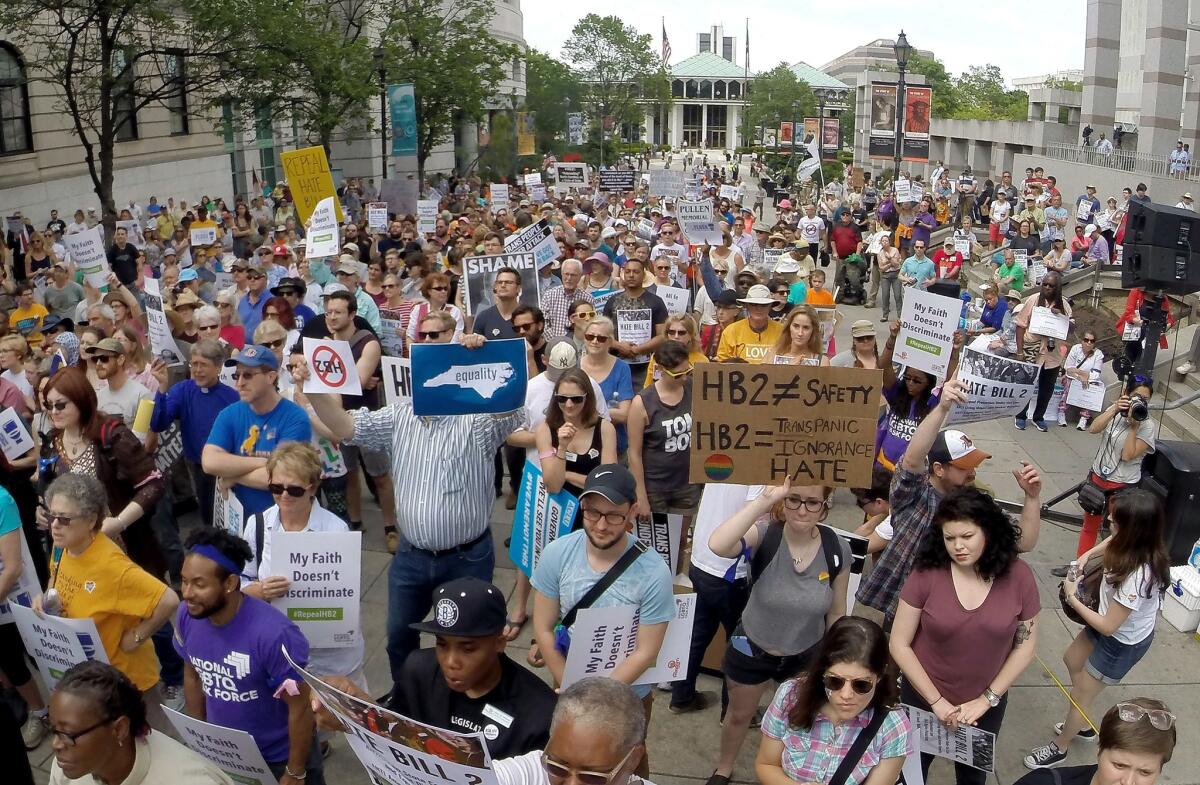Opinion: Think ‘bathroom bills’ and other anti-LGBT legislation don’t impact you? Think again

Protesters rally against House Bill 2 in Raleigh, N.C., on April 25.
Earlier this month, Mississippi passed a “religious liberty” bill, known as House Bill 1523, that allows businesses to deny services based on their “sincerely held religious beliefs.” After the legislation was signed into law on April 5, Gov. Phil Bryant claimed its intent was to “prevent government interference in the lives of the people from which all power to the state is derived.”
As numerous critics pointed out, however, that’s not what HB 1523 actually does in practice: The bill allows for broad-based discrimination against a host of different groups.
In fact, even if you’re not a member of the LGBT community, there are actually plenty of ways a bill like HB 1523 could be used against you.
For instance, HB 1523 allows businesses to discriminate based on their moral convictions that “marriage is or should be recognized as the union of one man and one woman” and “sexual relations are properly reserved to such a marriage.” Thus, the bill could be used to target unwed mothers and cohabitating couples, even heterosexual ones.
Let’s say Johnny and Mary are engaged and in the market for a one-bedroom apartment. If the landlord discovers that they are engaging in intercourse before marriage, he can decline their application.
HB 1523 also allows employers to set “sex-specific standards or policies concerning employee or student dress or grooming.” This means that women could potentially be fired for wearing pants to work or going makeup-free. Depending on the specifics of corporate dress codes, a male employee could be sacked by his boss for sporting a pink shirt in the office or a tie with flowers on it.
Because the language in HB 1523 is so vague, the possibilities are terrifyingly limitless. This is a pattern across recent anti-LGBT bills. Mississippi is not the exception but the rule.
North Carolina’s House Bill 2, signed into law on March 23, denies affirming restroom access to transgender people. The law requires instead that the state’s trans residents use the public bathroom that matches the sex they were assigned at birth, not their gender identity. The state’s governor, Pat McCrory, has defended the bill as necessary to protect “the basic expectation of privacy in the most personal of settings, a restroom or locker room.”
But legislation restricting trans bathroom access may actually lead to greater policing on the basis of perceived gender, meaning that users could be denied restroom entry even if they aren’t transgender. Last week, the Daily Mail reported that a teenage girl in England, Ny Richardson, was kicked out of a McDonald’s after being mistaken for a boy. The manager on duty spotted Richardson leaving the restroom and asked for identification. Because she didn’t have an ID, the 16-year-old was booted from the establishment. A nearly identical incident took place two years ago in Detroit.
What’s to stop the same thing from happening in North Carolina or the other nine states — including South Carolina, Illinois and Kentucky — currently mulling their own transphobic legislation?
If you’re a woman who gets a short haircut or dresses androgynously, HB 2 fosters an environment in which you could be stopped or harassed by police. Because the bill lacks clear guidelines on enforcement, you could be fined or even thrown in jail — that is, should you fail to adequately “prove” your gender.
This speaks to a larger truth about legislation that targets the gay, lesbian, bisexual and transgender community: It often impacts everyone.
For example, the failure of the Houston Equal Rights Ordinance, or HERO bill, last November showed how much we lose by blocking LGBT protections. That bill, which promised equal access in public accommodations, was voted down by conservatives opposed to provisions that would have allowed trans people to use the bathroom that most closely corresponds with their gender identity. In a radio ad attacking HERO, former baseball player Lance Berkman warned, “Proposition 1, the bathroom ordinance, would allow troubled men to enter women’s public bathrooms, showers, and locker rooms.”
What the transphobic panic missed is that trans people were just one of the groups included in Houston’s nondiscrimination ordinance. In total, HERO offered protections based on 15 different identity-based categories. It would have prohibited bias in housing and employment on the basis of factors including race, national origin, veteran status, disability and age. Basically, HERO would have applied to just about every single resident of Houston.
By coming out against HERO, opponents also were hurting pregnant women, the elderly and immigrants. That somehow got lost in the rush to demonize transgender people. The ordinance was voted down by a 25-point margin.
Legalized discrimination isn’t just bad for the LGBT community; it’s bad for anyone who just wants to use the restroom, go to work or live their life free of harassment. Laws like HB 1523 are a slippery slope to legalizing prejudice against just about anyone: women, children and even those who served in the military.
When you make it easier to discriminate against one group, you make it easier to discriminate against everyone.
Nico Lang is the East Coast reporter for the Advocate. You can also read his work on Salon, Onion A.V. Club and the Guardian. Find him on Twitter @nico_lang.
Follow the Opinion section on Twitter @latimesopinion and Facebook
More to Read
A cure for the common opinion
Get thought-provoking perspectives with our weekly newsletter.
You may occasionally receive promotional content from the Los Angeles Times.










